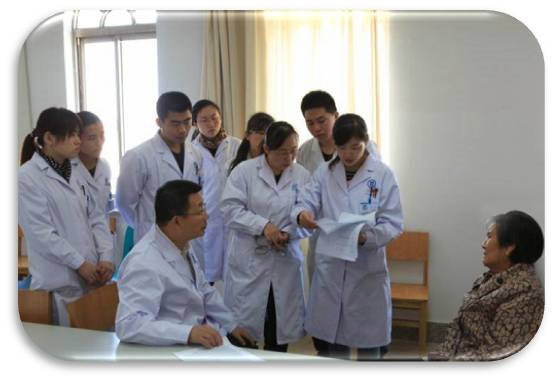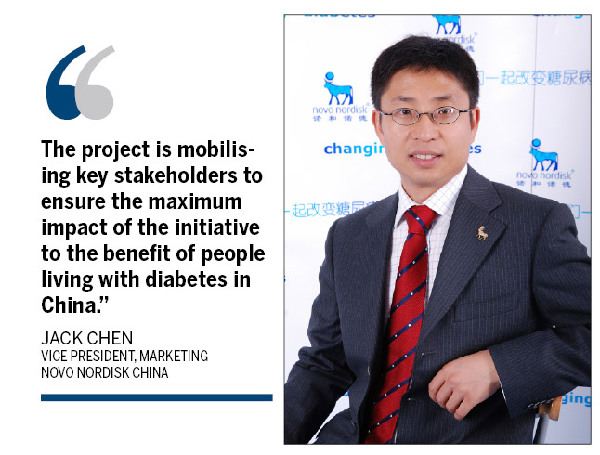Project of primary care elevation for diabetes
Updated: 2014-04-09 02:51
(China Daily USA)
|
||||||||
Project of primary care elevation for diabetes
- Easing the burden of diabetes in China

China's increasing elderly population, unhealthy lifestyle and environmental pollution are contributing to an escalating growth in chronic disease, including diabetes. According to a study published in the New England Journal of Medicine in 2010, China has 92 million people with diabetes. Furthermore, the study reported that 150 million people have impaired glucose intolerance (IGT) or pre-diabetes. IGT is a predictor of the expected future burden of diabetes.
Since early 2000, the Chinese government has invested heavily in its healthcare sector. In just five years, the total Chinese Healthcare spending has more than doubled from $156 billion in 2006 to $357 billion in 2011. Spending is projected to reach $1 trillion by 2020. It is estimated that 13% of total medical expenditures in China are directly caused by diabetes. The study also indicates that people with diabetes in rural China are less likely to receive medicines that can prevent disability and loss of life because they have less access to outpatient care treatment than people living in urban areas. The medical care costs for diabetes will presumably increase by 50% in China over the next two decades if the epidemic is not controlled.
The last figures from the International Diabetes Federation (IDF) show that more than 39 million Chinese people with diabetes live in rural areas, corresponding to 40% of all people with diabetes in China. Rural populations in China are ageing at a more rapid pace than those in cities, largely due to rural-to-urban migration. It is estimated that by 2030 the proportion of aged people living in rural areas will be 21.8% compared to 14.8% in urban centres. Consequently, the burden of chronic disease is expected to impact rural communities to a far greater extent than urban counterparts in the future.
The Chinese government has committed to bolstering healthcare reform to reduce the burden of chronic disease by establishing a universal primary care system providing safe, effective and convenient healthcare services. One major goal of healthcare reform is to improve the quality of primary care in the rural areas.
To assist Chinese government to reach the goal, Chinese Diabetes Society (CDS) joined hands with China International Medical Foundation kicked off the project of Primary Care Elevation for Diabetes in China in 2012. The program lasts four years supervised by National Health and Family Planning Commission of People's Republic of China (NHFPC) and sponsored by Novo Nordisk (China) Pharmaceutical Co., Ltd.
The project is composed of three major activities: Meeting the Expert/E-meeting the Experts, Mentor program and Key hospital visiting. In the past two years, the project covered 300 prefecture cities and 800 counties, more than 37,000 primary care physicians and 70,000 patients directly benefit from the project. Numerous patients have benefited indirectly from improved diagnosis and treatment capacity of primary care.

"The project is mobilising key stakeholders to ensure the maximum impact of the initiative to the benefit of people living with diabetes in China." Says Jack Chen, vice president, marketing, Novo Nordisk China. Different with traditional physician capability improvement activities, the project is a hands-on approach to training physicians in the hospitals in prefecture cities and counties, and healthcare centres in unban centres. The direct coaching and interactive patients case discussion has shown to be more effective than scientific lectures. Especially in low tier hospitals, the physicians need more hands-on clinical practice guidance.

More than 20 national top level endocrinologists and 400 local famous endocrinologists have been mobilized to join the project proactively to provide the training to primary care physicians. Professor Weng Jianping, CDS president, indicates that "Under the guidance and support of the NHFPC and Chinese Medical Society, CDS will continue to organise the diabetes experts to do more practical deeds for the physicians in rural areas with different and effective ways and methods, eventually benefit the diabetes patients with the standardized diabetes diagnosis and treatment technology."
These are important steps on the way to ease the burden of diabetes in China. Going forward, the project is scheduled to continue until the end of 2015 with plans to expand the project to more areas, increase the amount of physicians reached and refine the training material.

 Chinese schools vie in moot court
Chinese schools vie in moot court
 Vigil marks one month since MH370 vanished
Vigil marks one month since MH370 vanished
 The world in photos: March 31-April 6
The world in photos: March 31-April 6
 Simply child's play
Simply child's play
 Photo special: Weird buildings in China
Photo special: Weird buildings in China
 Jackie Chan holds charity concert marking 60th birthday
Jackie Chan holds charity concert marking 60th birthday
 Microsoft to end support for Windows XP
Microsoft to end support for Windows XP
 Poor weather greets baby prince
Poor weather greets baby prince
Most Viewed
Editor's Picks

|

|

|

|

|

|
Today's Top News
Tech gap exposed in search mission
Carrier visit underscores transparency
The tough battle with the army of American lobbyists
Urbanization called major 'tectonic' event by expert
Chinese schools vie in moot court
Chinese, US defense chiefs begin talks
Time runs short in MH370 hunt
Zillow offers US real estate listings
US Weekly

|

|







